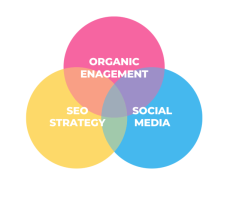The Ultimate Guide To Social Commerce
If you’re wondering how much social media can impact your e-commerce business, you need to learn about social commerce. From driving sales, increasing conversion rates and improving your webpages ranking on Google’s search engine, it’s become an essential part of digital marketing for 2023.
What Is Social Commerce?
Social e-commerce involves using social media platforms to create a more personalised and targeted in-app shopping experience by centring e-commerce functions directly into your social media applications. This makes it easier for satisfied shoppers to share their positive experiences with other potential customers and can provide consistent online exposure for your e-commerce business. Given the existing algorithm of some of the most popular social media and e-commerce hybrid platforms such as TikTok, it also gives your digital marketing content a much higher chance of achieving vitality.
This form of multi-channel marketing will continue to play an even bigger role in marketing strategies as we enter the new year and smartphones become the primary vessel to consume media content. Some examples of social commerce platforms include Meta, TikTok, Twitter and Pinterest where users are directly linked to an online store that sells the goods or services pictured in images they’re viewing. If you’re looking for a new way to drive sales in 2023, social commerce is the future of driving online sales and building a dedicated customer base.
Can It Boost Your Search Engine Ranking?
Having high metrics of engagement on social media platforms can improve the success of your e-commerce business far beyond direct transactions. In many cases it’s been statistically proven that social commerce also significantly increases the amount of traffic to your website which in turn will have an impact on your Google search results. Of course this number can vary with the overall success of your business, but it will definitely improve the results of your SEO strategy.
Multi-channel social media marketing has been very prevalent within the last two years and by focusing on social commerce, you’re giving your online store multiple avenues of engagement with your consumers that are likely to boost your conversion rates. Whether it’s sharing links to content on your webpages through Instagram or dedicating a team to creating a social presence across YouTube, it’s something that will become essential to maintaining customers in the nearby future.
How To Improve Organic Engagement
Building your website’s social media audience is the first and arguably most important step in turning engagement into sales conversions. But one of the often most overlooked benefits of prioritising social commerce is the creative control you have as a business and the impact those decisions can have on what kind of consumer demographic you grow. You’re able to ensure any content produced and shared is reaching the right customers for your business and by creating an online personality for your brand, it will increase the likelihood of building stronger and more loyal relationships with consumers

Part of this involves being proactive on social media platforms beyond scheduled posting and interacting with comments, external sharing of content and online reviews. Social commerce also provides a unique outlet for two-way communication between online businesses and their consumers, building trust and a much more organic relationship.
Customer Retention & Multi-Channel Marketing
As mentioned earlier, the level of two-way engagement social e-commerce encourages allows for a more direct and organic line of communication between you and your customers. By focusing on using social commerce for your online business, you’re not only prioritising selling your goods and services, but finding out what qualifiers are important when building your customer base. Particularly if you engage in multi-channel digital marketing across a variety of the most popular social media platforms, as this makes it very clear what separates the people interested in your goods and services from those who aren’t.
Social commerce not only helps produce and share content, but also provides an incredibly in depth range of data analytics you can continue to use to improve your digital marketing strategy with. You’ll no longer have to wonder what element of that specific singular post didn’t bring in engagement, as you’ll see your campaigns perform across a diverse range of people from across the globe consuming your content in various platforms. For this reason, social commerce strategies pair perfectly with the use of pillar and cluster pages.

The simplest way to begin executing a multi-channel social commerce strategy is to choose a hero platform that will retain your more lengthy content such as long product and service videos, then redistribute them edited according to the algorithm of any other platforms you choose to use. But with organic engagement comes organic responses, so steer clear of generic corporate style media that could potentially ruin the accessible and relatable image social commerce can build.
E-Commerce Metrics
Social media commerce makes analysing and evaluating content performance easier than ever, as most major platforms have built in business modes that provide in depth details for anyone using their applications as a place to host an e-commerce business. Alongside standard social media measurements such as your follower count, platforms like Facebook, Instagram business accounts and Twitter all have built-in features that can show you a more detailed metrics report that includes your customer impressions, engagements and reach. Additionally, most social media applications now allow you to measure interactions from the app to your website through webpage click counts.
If you’re ready to build a social commerce strategy but don’t know where to start, feel free to reach out to our digital agency Melbourne team and book a consultation to see how to transform your e-commerce business now!
